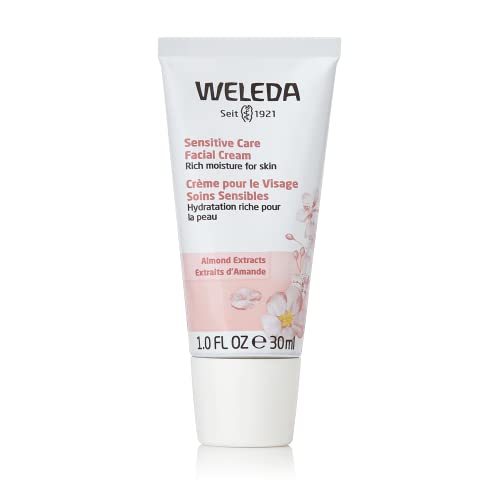
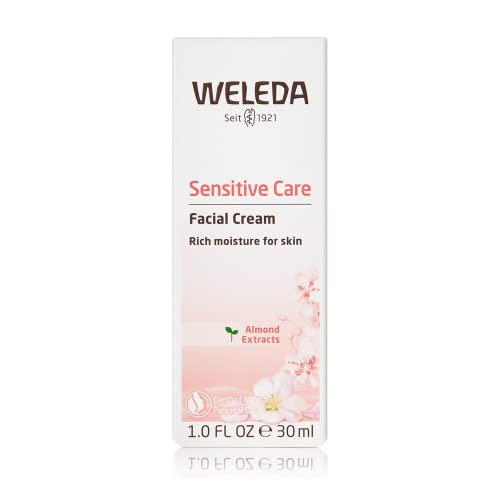
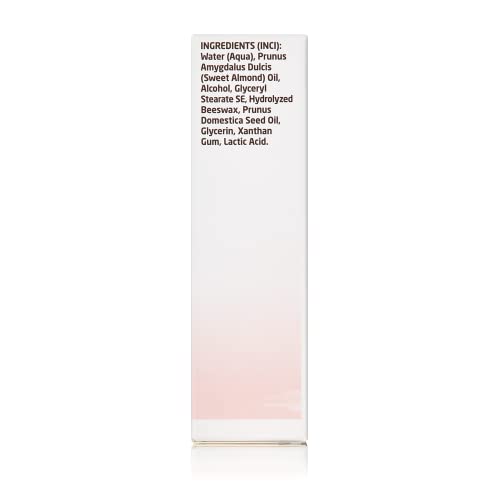
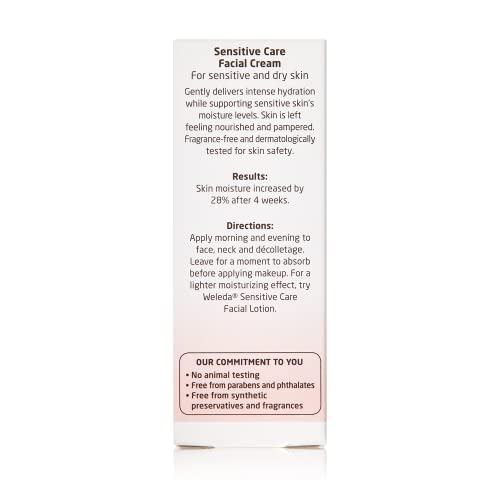
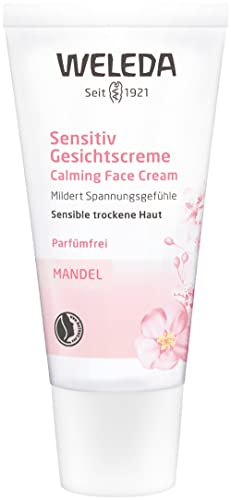
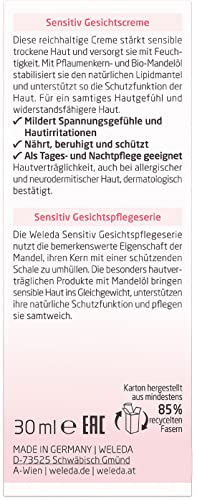
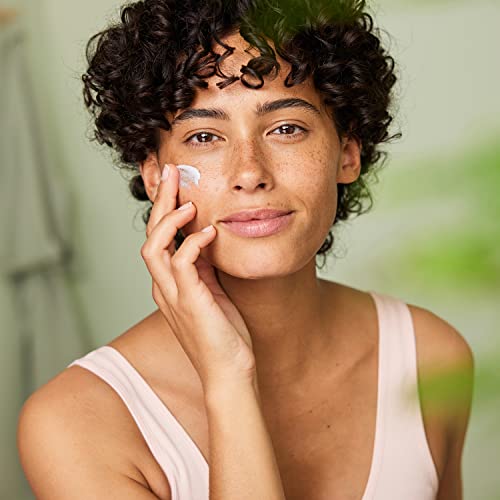



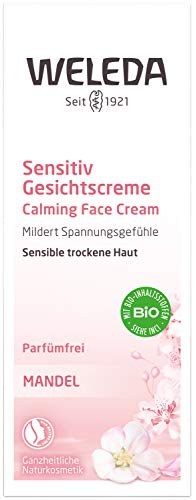
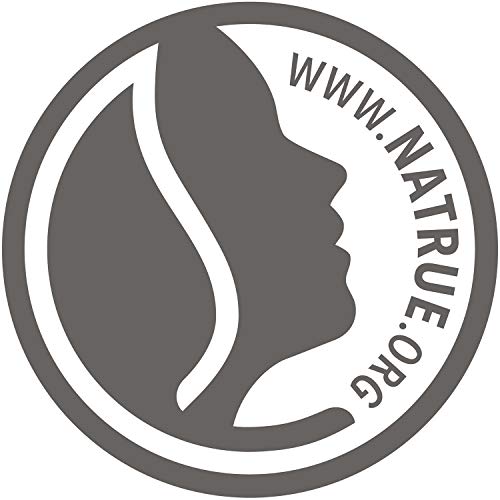
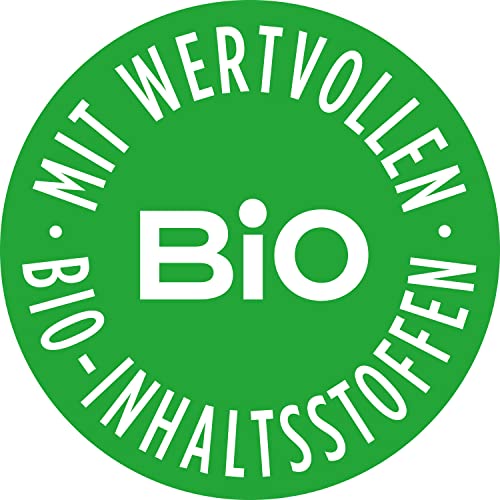
Weleda Sensitive Care Moisturizer - Fragrance-Free Comfort with Almond Oil - 1oz


Lactic Acid
High RiskLactic acid is an alpha hydroxy acid naturally found in milk and fruits. It is commonly used in skincare products for its exfoliating properties, promoting skin renewal and hydration. It can enhance the absorption of other ingredients and is often utilized in formulations aimed at improving skin texture.
Sustai Insights
Lactic acid offers functional benefits such as effective exfoliation and skin hydration. However, it may pose health risks like skin irritation and enhanced absorption of other ingredients, which can lead to increased sensitivity. Regulatory bodies have set high use restrictions due to these concerns. Environmentally, it is not considered bioaccumulative, but care should be taken in disposal to avoid pollution. Overall, the risk level is assessed as high, and usage should be approached with caution, particularly in sensitive populations. Alternatives like glycolic acid may provide similar benefits with varied safety profiles.
Glycerin
Medium RiskGlycerin (also called glycerol) is a naturally occurring compound commonly used in personal care and cosmetic products. It functions as a humectant, attracting moisture to the skin, and is also utilized as a solvent and emollient to enhance product texture and stability.
Sustai Insights
Glycerin is valued for its effective moisturizing properties and biodegradability, making it a widely accepted ingredient in formulations. It poses low health risks, including low concerns for carcinogenicity and allergies. However, moderate use restrictions exist due to regulatory guidelines. While glycerin does not significantly contribute to environmental pollution, its production process should be ethically sourced. Overall, glycerin holds a medium risk level, emphasizing the importance of safe usage practices and considering sustainable alternatives.
Glyceryl Stearate Se
Low RiskGlyceryl stearate SE is a self-emulsifying ingredient commonly used in cosmetic formulations to stabilize and thicken products. It acts as an emulsifier, helping to blend oil and water components effectively, which enhances the product's texture and stability.
Sustai Insights
Glyceryl stearate SE offers functional benefits as an emulsifier, promoting stability in formulations. It is considered low risk for health concerns, including cancer, allergies, and reproductive toxicity, with no significant environmental hazards reported. Regulatory bodies have not imposed restrictions on its use. Safe usage practices suggest following recommended concentrations in products. Overall, this ingredient is assessed as low risk, with no immediate alternatives needed.
Prunus Domestica (Plum) Seed Oil
Low RiskPrunus domestica (plum) seed oil is a fixed oil extracted from the seeds of the plum fruit. It serves primarily as an emollient, providing moisture and lubrication to skin and hair products. This oil is characterized by its light texture and is often used in cosmetic formulations for its conditioning properties.
Sustai Insights
Prunus domestica seed oil offers functional benefits as an emollient, enhancing product texture and moisture retention. It is sustainably sourced and biodegradable. Health risks are minimal, with low concerns for carcinogenicity, allergens, and reproductive toxicity. Environmental risks are also low, and no significant regulatory warnings are noted. Overall, the ingredient is assessed as low risk, making it a safe option in cosmetic applications.
Hydrolyzed Beeswax
Low RiskHydrolyzed beeswax is a hydrolysate of beeswax, commonly used in cosmetic and personal care formulations. It functions primarily as an emulsifier and thickening agent, contributing to the texture and stability of products.
Sustai Insights
Hydrolyzed beeswax offers functional benefits as an effective emulsifier and thickener, enhancing product texture. It is biodegradable and can be sustainably sourced. Health risks are low, with minimal concerns regarding carcinogenicity, allergenic potential, or reproductive toxicity; however, contamination concerns are noted. Environmental risks are also low, with no significant pollutants or bioaccumulation effects reported. Regulatory bodies do not currently list any restrictions for this ingredient, leading to an overall low risk assessment. Safe usage practices should be followed, and alternatives like plant-based waxes may be considered.
Prunus Amygdalus Dulcis (Sweet Almond) Oil
Low RiskPrunus amygdalus dulcis (sweet almond) oil is derived from the seeds of the almond tree. It is commonly used in cosmetic formulations for its moisturizing properties and as a carrier oil for other active ingredients. Its light texture allows for easy absorption into the skin.
Sustai Insights
Sweet almond oil provides functional benefits such as effective skin hydration and enhancement of skin absorption for other compounds. It is sustainably sourced and biodegradable. Health risks are low, with minimal concerns regarding carcinogenicity, allergies, and reproductive toxicity. Environmental risks are also low, with no significant pollutant or bioaccumulation potential. Regulatory bodies currently do not impose restrictions on its use. Overall, the risk assessment indicates a low risk level, making it a safe choice in cosmetic applications.
Ethanol
Low RiskEthanol, also known as ethyl alcohol, is a volatile, colorless liquid commonly used as a solvent, preservative, and antiseptic in various personal care products. It serves as a penetration enhancer, improving the absorption of other ingredients through the skin.
Sustai Insights
Ethanol functions effectively as a preservative and solvent, offering benefits such as enhanced ingredient absorption and antimicrobial properties. It is biodegradable and can be sustainably sourced. Health risks are minimal, with low concerns for carcinogenicity, allergies, and developmental toxicity. Environmental impacts are also low, with no significant pollutant potential. Regulatory agencies do not impose restrictions on its use. Overall, ethanol is considered low risk, making it a widely accepted ingredient in personal care formulations.
Water
Low RiskWater is a clear, colorless liquid essential for various biological processes. It serves as a solvent in formulations, facilitating the dissolution of other ingredients and enhancing product texture and application. Additionally, water plays a crucial role in hydration and is a key component in many cosmetic and personal care products.
Sustai Insights
Water is an effective solvent and hydrator, contributing to the texture and efficacy of formulations. It is biodegradable and generally regarded as safe, with low concerns regarding carcinogenicity, allergies, and reproductive toxicity. However, excessive water usage can lead to environmental concerns, particularly regarding resource depletion. Regulatory bodies do not impose restrictions on water use in cosmetics. Overall, the risks associated with water are low, making it a safe and essential ingredient.
Xanthan Gum
Low RiskXanthan gum is a polysaccharide, a sugar-based compound produced by the fermentation of glucose or sucrose. It is commonly used as a thickening agent and stabilizer in various food and cosmetic products due to its ability to improve texture and prevent ingredient separation.
Sustai Insights
Xanthan gum serves effectively as a thickener and stabilizer, enhancing product texture and consistency. It is biodegradable and typically derived from renewable sources, supporting sustainability efforts. Health risks are minimal, with low concerns regarding carcinogenicity, allergies, and reproductive toxicity. Environmental impact is similarly low, posing no significant hazards. Regulatory agencies, including the FDA, regard it as safe for use, with no significant restrictions. Overall, xanthan gum is assessed as low risk, making it a suitable ingredient in formulations.
Glyceryl Stearate Se
Low RiskGlyceryl stearate SE is a self-emulsifying ingredient commonly used in cosmetic formulations to stabilize and thicken products. It acts as an emulsifier, helping to blend oil and water components effectively, which enhances the product's texture and stability.
Sustai Insights
Glyceryl stearate SE offers functional benefits as an emulsifier, promoting stability in formulations. It is considered low risk for health concerns, including cancer, allergies, and reproductive toxicity, with no significant environmental hazards reported. Regulatory bodies have not imposed restrictions on its use. Safe usage practices suggest following recommended concentrations in products. Overall, this ingredient is assessed as low risk, with no immediate alternatives needed.
Prunus Domestica (Plum) Seed Oil
Low RiskPrunus domestica (plum) seed oil is a fixed oil extracted from the seeds of the plum fruit. It serves primarily as an emollient, providing moisture and lubrication to skin and hair products. This oil is characterized by its light texture and is often used in cosmetic formulations for its conditioning properties.
Sustai Insights
Prunus domestica seed oil offers functional benefits as an emollient, enhancing product texture and moisture retention. It is sustainably sourced and biodegradable. Health risks are minimal, with low concerns for carcinogenicity, allergens, and reproductive toxicity. Environmental risks are also low, and no significant regulatory warnings are noted. Overall, the ingredient is assessed as low risk, making it a safe option in cosmetic applications.
Hydrolyzed Beeswax
Low RiskHydrolyzed beeswax is a hydrolysate of beeswax, commonly used in cosmetic and personal care formulations. It functions primarily as an emulsifier and thickening agent, contributing to the texture and stability of products.
Sustai Insights
Hydrolyzed beeswax offers functional benefits as an effective emulsifier and thickener, enhancing product texture. It is biodegradable and can be sustainably sourced. Health risks are low, with minimal concerns regarding carcinogenicity, allergenic potential, or reproductive toxicity; however, contamination concerns are noted. Environmental risks are also low, with no significant pollutants or bioaccumulation effects reported. Regulatory bodies do not currently list any restrictions for this ingredient, leading to an overall low risk assessment. Safe usage practices should be followed, and alternatives like plant-based waxes may be considered.
Prunus Amygdalus Dulcis (Sweet Almond) Oil
Low RiskPrunus amygdalus dulcis (sweet almond) oil is derived from the seeds of the almond tree. It is commonly used in cosmetic formulations for its moisturizing properties and as a carrier oil for other active ingredients. Its light texture allows for easy absorption into the skin.
Sustai Insights
Sweet almond oil provides functional benefits such as effective skin hydration and enhancement of skin absorption for other compounds. It is sustainably sourced and biodegradable. Health risks are low, with minimal concerns regarding carcinogenicity, allergies, and reproductive toxicity. Environmental risks are also low, with no significant pollutant or bioaccumulation potential. Regulatory bodies currently do not impose restrictions on its use. Overall, the risk assessment indicates a low risk level, making it a safe choice in cosmetic applications.
Lactic Acid
High RiskLactic acid is an alpha hydroxy acid naturally found in milk and fruits. It is commonly used in skincare products for its exfoliating properties, promoting skin renewal and hydration. It can enhance the absorption of other ingredients and is often utilized in formulations aimed at improving skin texture.
Sustai Insights
Lactic acid offers functional benefits such as effective exfoliation and skin hydration. However, it may pose health risks like skin irritation and enhanced absorption of other ingredients, which can lead to increased sensitivity. Regulatory bodies have set high use restrictions due to these concerns. Environmentally, it is not considered bioaccumulative, but care should be taken in disposal to avoid pollution. Overall, the risk level is assessed as high, and usage should be approached with caution, particularly in sensitive populations. Alternatives like glycolic acid may provide similar benefits with varied safety profiles.
Ethanol
Low RiskEthanol, also known as ethyl alcohol, is a volatile, colorless liquid commonly used as a solvent, preservative, and antiseptic in various personal care products. It serves as a penetration enhancer, improving the absorption of other ingredients through the skin.
Sustai Insights
Ethanol functions effectively as a preservative and solvent, offering benefits such as enhanced ingredient absorption and antimicrobial properties. It is biodegradable and can be sustainably sourced. Health risks are minimal, with low concerns for carcinogenicity, allergies, and developmental toxicity. Environmental impacts are also low, with no significant pollutant potential. Regulatory agencies do not impose restrictions on its use. Overall, ethanol is considered low risk, making it a widely accepted ingredient in personal care formulations.
Water
Low RiskWater is a clear, colorless liquid essential for various biological processes. It serves as a solvent in formulations, facilitating the dissolution of other ingredients and enhancing product texture and application. Additionally, water plays a crucial role in hydration and is a key component in many cosmetic and personal care products.
Sustai Insights
Water is an effective solvent and hydrator, contributing to the texture and efficacy of formulations. It is biodegradable and generally regarded as safe, with low concerns regarding carcinogenicity, allergies, and reproductive toxicity. However, excessive water usage can lead to environmental concerns, particularly regarding resource depletion. Regulatory bodies do not impose restrictions on water use in cosmetics. Overall, the risks associated with water are low, making it a safe and essential ingredient.
Glycerin
Medium RiskGlycerin (also called glycerol) is a naturally occurring compound commonly used in personal care and cosmetic products. It functions as a humectant, attracting moisture to the skin, and is also utilized as a solvent and emollient to enhance product texture and stability.
Sustai Insights
Glycerin is valued for its effective moisturizing properties and biodegradability, making it a widely accepted ingredient in formulations. It poses low health risks, including low concerns for carcinogenicity and allergies. However, moderate use restrictions exist due to regulatory guidelines. While glycerin does not significantly contribute to environmental pollution, its production process should be ethically sourced. Overall, glycerin holds a medium risk level, emphasizing the importance of safe usage practices and considering sustainable alternatives.
Xanthan Gum
Low RiskXanthan gum is a polysaccharide, a sugar-based compound produced by the fermentation of glucose or sucrose. It is commonly used as a thickening agent and stabilizer in various food and cosmetic products due to its ability to improve texture and prevent ingredient separation.
Sustai Insights
Xanthan gum serves effectively as a thickener and stabilizer, enhancing product texture and consistency. It is biodegradable and typically derived from renewable sources, supporting sustainability efforts. Health risks are minimal, with low concerns regarding carcinogenicity, allergies, and reproductive toxicity. Environmental impact is similarly low, posing no significant hazards. Regulatory agencies, including the FDA, regard it as safe for use, with no significant restrictions. Overall, xanthan gum is assessed as low risk, making it a suitable ingredient in formulations.
Discover the soothing touch of Weleda Sensitive Care Face Cream, a fragrance-free moisturizer designed to pamper sensitive skin. Enriched with nourishing sweet almond oil, this plant-rich formula hydrates and comforts, making it perfect for day and night use.
- Hydration and Comfort: This cream supports moisture levels, alleviating dryness with a silky finish that soothes sensitive skin.
- Natural Ingredients: Made with carefully selected flower, fruit, and root extracts, it avoids synthetic compounds, ensuring a gentle touch.
- Versatile Use: Ideal for daily application, it absorbs quickly—perfect for layering under makeup or other skincare products.
- Mindful Skincare: Rich in plant oils, it brightens your spirit while calming your mind, promoting overall well-being.
- Eco-Conscious Choice: Committed to sustainability, Weleda’s ethical practices ensure that every tube contributes to a healthier planet.
Experience the nurturing care of Weleda and embrace a holistic approach to skincare.
Subscribe & Save with Sustai
- Best Price Guarantee: Always enjoy the lowest prices on sustainable home essentials.
- No Surprises: We’ll notify you before shipping. No hidden fees, ever.
- You’re in Charge: Change, pause, or cancel your subscription anytime with ease.
- Eco-Friendly Deliveries: Our grouped shipments mean less packaging and lower emissions.
Join us on a sustainable journey. Special offers for a limited time! Prices and promotions may change.
Recommended Products
Discover the soothing touch of Weleda Sensitive Care Face Cream, a fragrance-free moisturizer designed to pamper sensitive skin. Enriched with nourishing sweet almond oil, this plant-rich formula hydrates and comforts, making it perfect for day and night use.
- Hydration and Comfort: This cream supports moisture levels, alleviating dryness with a silky finish that soothes sensitive skin.
- Natural Ingredients: Made with carefully selected flower, fruit, and root extracts, it avoids synthetic compounds, ensuring a gentle touch.
- Versatile Use: Ideal for daily application, it absorbs quickly—perfect for layering under makeup or other skincare products.
- Mindful Skincare: Rich in plant oils, it brightens your spirit while calming your mind, promoting overall well-being.
- Eco-Conscious Choice: Committed to sustainability, Weleda’s ethical practices ensure that every tube contributes to a healthier planet.
Experience the nurturing care of Weleda and embrace a holistic approach to skincare.

You can have at most 2 Sustainable Steals products in your cart
Customer Reviews
Customers’ View
Customers appreciate the moisturizing and protective properties of Weleda Sensitive Care Face Cream, noting its suitability for sensitive and dry skin. Many users find it effectively hydrates their skin without causing irritation, with one stating, 'It works wonderfully for softening eczema and reducing inflammation.' The cream's thicker texture is another highlight, as it offers a richer application than standard lotions while still being easily absorbed. While some customers have mixed feelings about its scent and greasiness, the overall sentiment leans towards satisfaction with its natural ingredients and quality. Additionally, many value the absence of synthetic compounds, aligning with their eco-friendly and health-conscious values. Overall, customers find this product to be a reliable choice for maintaining skin health without harmful additives.
AI-generated from the text of customer reviewsThis product is rated 4.5 of 5.0 stars.
It has received 4 reviews.




